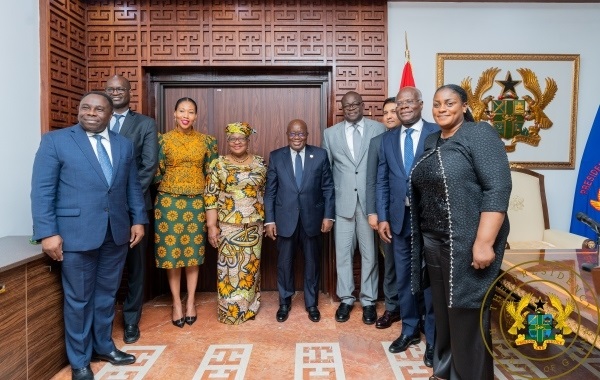President Akufo-Addo (4th left), Ngozi Okonjo-Iweala (3rd left), KT Hammond (2nd right) and Dokua Asiamah-Adjei (1st right) at the Jubilee House
The Director General of the World Trade Organisation (WTO), Ngozi Okonjo-Iweala, has called on the government to as a matter of urgency take steps to ratify the WTO’s new agreement on fisheries subsidy.
Madam Okonjo-Iweala said the agreement on fisheries subsidies was adopted at the 12th Ministerial Conference (MC12) on June 17, 2022.
The move, she said, marked a major step forward for ocean sustainability by prohibiting harmful fisheries subsidies, which are a key factor in the widespread depletion of the world’s fish stock.
It also represents a historic achievement for the membership of the WTO as the first Sustainable Development Goal (SDG) target to be fully met, the first SDG target met through a multilateral agreement, the first WTO agreement to focus on the environment, the first broad, binding, multilateral agreement on ocean sustainability, and only the second agreement reached at the WTO since its inception on January 1, 1995.
Madam Okonjo-Iweala disclosed that for the agreement to become operational, two-thirds of the 164 members of the World Trade Organisation have to deposit their “instruments of acceptance” with the WTO.
She made the call when she paid a visit to President Akufo-Addo at the Jubilee House to among others discuss issues affecting the organisation and its member states.
Madam Okonjo-Iweala, said her organisation has “succeeded after 21 years of deadlock to reach an agreement on the fisheries subsidy agreement.”
According to the WTO boss, the second thing that the fisheries subsidy agreement will introduce when it comes into force is that, it will require fisher folk to “be transparent about their fisheries numbers and anyone who catches and can report these illegal and unreported fishing, can bring them to the WTO tribunal to seek justice.”
“We need to stop illegal fishing and overfishing in our waters. We have managed to get this agreement, but for it to take hold, it has to be ratified by two-thirds of WTO’s members.
“We have 44 African countries. If we don’t get them to ratify, we will never get the two-thirds. So, I wanted to get your Excellency’s [President Akufo-Addo’s] support. If we can get Ghana to ratify and the ECOWAS countries to do the same, it will be very helpful,” she emphasised.
“We need 109 members to ratify. The good news is that the first to ratify is Switzerland and [everybody joked] that it is a landlocked country so it has no fish to fry so to say, but then Singapore ratified and the first African country to ratify was Seychelles”
The WTO boss however noted, “I don’t want Africa to be behind because we are the biggest beneficiaries. The largest subsidisers are China (6.8 billion), followed by the EU (3.8 billion), the US (3.4 billion), and among others,” she further remarked.
President Akufo-Addo, welcomed the call made by the WTO Director General for Ghana to ratify the fisheries subsidy agreement.
He directed the Minister for Trade and Industry, K.T. Hammond, to liaise with the Ministry of Fisheries and the Ministry of Agriculture to see how best Ghana can give consideration to the agreement for purposes of getting it ratified.
The World Trade Organisation (WTO) is the only global international organisation dealing with the rules of trade between nations. At its heart are the WTO agreements, negotiated and signed by the bulk of the world’s trading nations and ratified in their parliaments.
The goal of the WTO is to ensure that trade flows as smoothly, predictably, and freely as possible. The WTO has many roles: it operates a global system of trade rules, it acts as a forum for negotiating trade agreements, it settles trade disputes between its members and it supports the needs of developing countries.
By Charles Takyi-Boadu, Presidential Correspondent


